Reflective Report: Learning Experience on Diwan of Royal Court Project
VerifiedAdded on 2020/04/15
|7
|2858
|131
Report
AI Summary
This report provides a detailed reflective account of a student's learning experience during a project focused on the Diwan of Royal Court, Oman. The student explores their personal development, problem-solving skills, and adaptability through the project. The report outlines the challenges faced, including time management and distractions, and the strategies used to overcome them, such as maintaining a notebook and discussing concepts with a roommate. The student utilizes Schon's model of reflection, examining both "reflection in action" and "reflection on action" to analyze their learning process. The project involved applying various tools and techniques to assess administrative issues and propose recommendations. The student reflects on their strengths and weaknesses, highlighting the evolution of their analytical skills and the importance of adapting theoretical knowledge to real-world scenarios. The conclusion emphasizes the value of the learning experience and a commitment to future projects to further enhance their skills and knowledge.
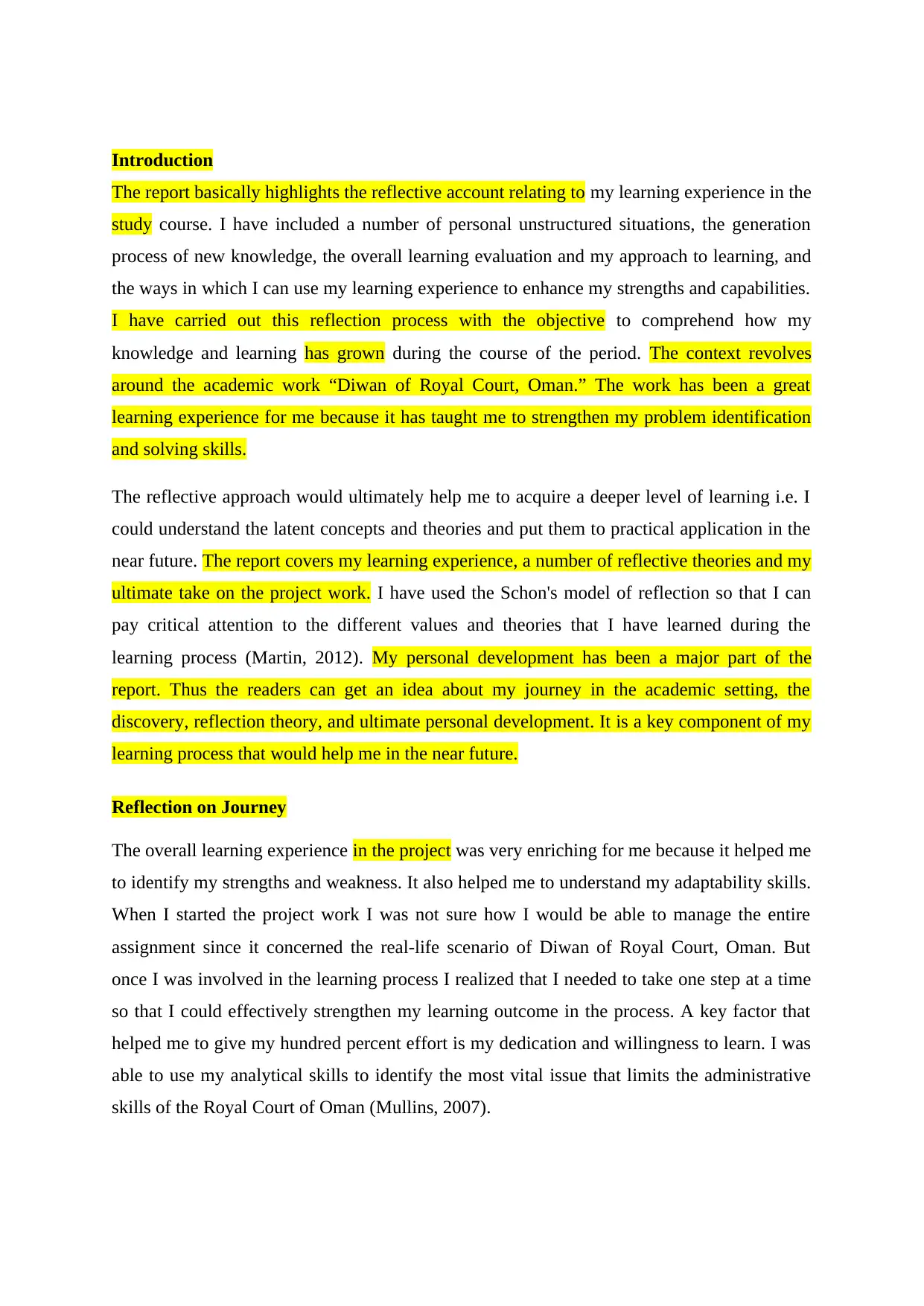
Introduction
The report basically highlights the reflective account relating to my learning experience in the
study course. I have included a number of personal unstructured situations, the generation
process of new knowledge, the overall learning evaluation and my approach to learning, and
the ways in which I can use my learning experience to enhance my strengths and capabilities.
I have carried out this reflection process with the objective to comprehend how my
knowledge and learning has grown during the course of the period. The context revolves
around the academic work “Diwan of Royal Court, Oman.” The work has been a great
learning experience for me because it has taught me to strengthen my problem identification
and solving skills.
The reflective approach would ultimately help me to acquire a deeper level of learning i.e. I
could understand the latent concepts and theories and put them to practical application in the
near future. The report covers my learning experience, a number of reflective theories and my
ultimate take on the project work. I have used the Schon's model of reflection so that I can
pay critical attention to the different values and theories that I have learned during the
learning process (Martin, 2012). My personal development has been a major part of the
report. Thus the readers can get an idea about my journey in the academic setting, the
discovery, reflection theory, and ultimate personal development. It is a key component of my
learning process that would help me in the near future.
Reflection on Journey
The overall learning experience in the project was very enriching for me because it helped me
to identify my strengths and weakness. It also helped me to understand my adaptability skills.
When I started the project work I was not sure how I would be able to manage the entire
assignment since it concerned the real-life scenario of Diwan of Royal Court, Oman. But
once I was involved in the learning process I realized that I needed to take one step at a time
so that I could effectively strengthen my learning outcome in the process. A key factor that
helped me to give my hundred percent effort is my dedication and willingness to learn. I was
able to use my analytical skills to identify the most vital issue that limits the administrative
skills of the Royal Court of Oman (Mullins, 2007).
The report basically highlights the reflective account relating to my learning experience in the
study course. I have included a number of personal unstructured situations, the generation
process of new knowledge, the overall learning evaluation and my approach to learning, and
the ways in which I can use my learning experience to enhance my strengths and capabilities.
I have carried out this reflection process with the objective to comprehend how my
knowledge and learning has grown during the course of the period. The context revolves
around the academic work “Diwan of Royal Court, Oman.” The work has been a great
learning experience for me because it has taught me to strengthen my problem identification
and solving skills.
The reflective approach would ultimately help me to acquire a deeper level of learning i.e. I
could understand the latent concepts and theories and put them to practical application in the
near future. The report covers my learning experience, a number of reflective theories and my
ultimate take on the project work. I have used the Schon's model of reflection so that I can
pay critical attention to the different values and theories that I have learned during the
learning process (Martin, 2012). My personal development has been a major part of the
report. Thus the readers can get an idea about my journey in the academic setting, the
discovery, reflection theory, and ultimate personal development. It is a key component of my
learning process that would help me in the near future.
Reflection on Journey
The overall learning experience in the project was very enriching for me because it helped me
to identify my strengths and weakness. It also helped me to understand my adaptability skills.
When I started the project work I was not sure how I would be able to manage the entire
assignment since it concerned the real-life scenario of Diwan of Royal Court, Oman. But
once I was involved in the learning process I realized that I needed to take one step at a time
so that I could effectively strengthen my learning outcome in the process. A key factor that
helped me to give my hundred percent effort is my dedication and willingness to learn. I was
able to use my analytical skills to identify the most vital issue that limits the administrative
skills of the Royal Court of Oman (Mullins, 2007).
Paraphrase This Document
Need a fresh take? Get an instant paraphrase of this document with our AI Paraphraser
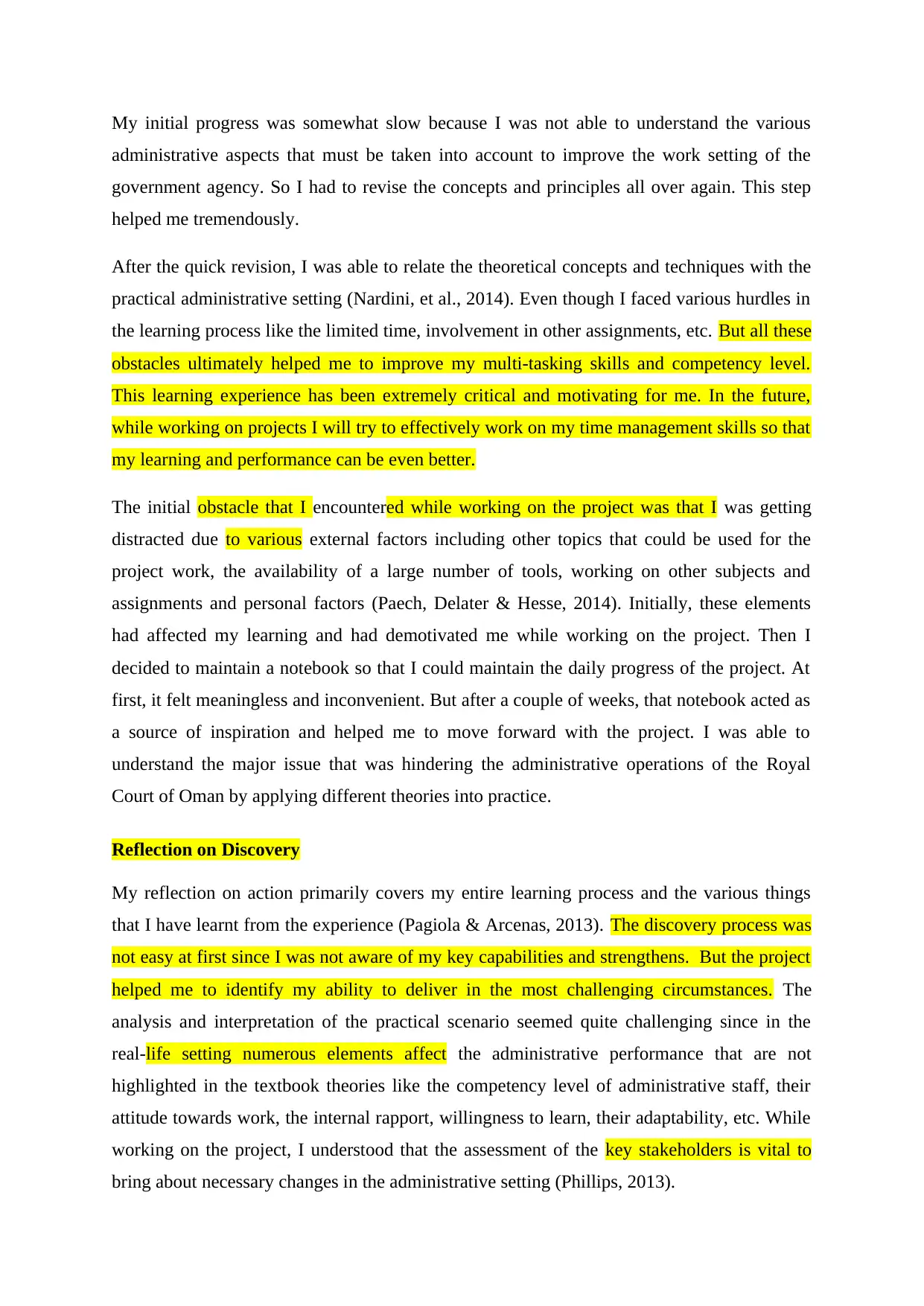
My initial progress was somewhat slow because I was not able to understand the various
administrative aspects that must be taken into account to improve the work setting of the
government agency. So I had to revise the concepts and principles all over again. This step
helped me tremendously.
After the quick revision, I was able to relate the theoretical concepts and techniques with the
practical administrative setting (Nardini, et al., 2014). Even though I faced various hurdles in
the learning process like the limited time, involvement in other assignments, etc. But all these
obstacles ultimately helped me to improve my multi-tasking skills and competency level.
This learning experience has been extremely critical and motivating for me. In the future,
while working on projects I will try to effectively work on my time management skills so that
my learning and performance can be even better.
The initial obstacle that I encountered while working on the project was that I was getting
distracted due to various external factors including other topics that could be used for the
project work, the availability of a large number of tools, working on other subjects and
assignments and personal factors (Paech, Delater & Hesse, 2014). Initially, these elements
had affected my learning and had demotivated me while working on the project. Then I
decided to maintain a notebook so that I could maintain the daily progress of the project. At
first, it felt meaningless and inconvenient. But after a couple of weeks, that notebook acted as
a source of inspiration and helped me to move forward with the project. I was able to
understand the major issue that was hindering the administrative operations of the Royal
Court of Oman by applying different theories into practice.
Reflection on Discovery
My reflection on action primarily covers my entire learning process and the various things
that I have learnt from the experience (Pagiola & Arcenas, 2013). The discovery process was
not easy at first since I was not aware of my key capabilities and strengthens. But the project
helped me to identify my ability to deliver in the most challenging circumstances. The
analysis and interpretation of the practical scenario seemed quite challenging since in the
real-life setting numerous elements affect the administrative performance that are not
highlighted in the textbook theories like the competency level of administrative staff, their
attitude towards work, the internal rapport, willingness to learn, their adaptability, etc. While
working on the project, I understood that the assessment of the key stakeholders is vital to
bring about necessary changes in the administrative setting (Phillips, 2013).
administrative aspects that must be taken into account to improve the work setting of the
government agency. So I had to revise the concepts and principles all over again. This step
helped me tremendously.
After the quick revision, I was able to relate the theoretical concepts and techniques with the
practical administrative setting (Nardini, et al., 2014). Even though I faced various hurdles in
the learning process like the limited time, involvement in other assignments, etc. But all these
obstacles ultimately helped me to improve my multi-tasking skills and competency level.
This learning experience has been extremely critical and motivating for me. In the future,
while working on projects I will try to effectively work on my time management skills so that
my learning and performance can be even better.
The initial obstacle that I encountered while working on the project was that I was getting
distracted due to various external factors including other topics that could be used for the
project work, the availability of a large number of tools, working on other subjects and
assignments and personal factors (Paech, Delater & Hesse, 2014). Initially, these elements
had affected my learning and had demotivated me while working on the project. Then I
decided to maintain a notebook so that I could maintain the daily progress of the project. At
first, it felt meaningless and inconvenient. But after a couple of weeks, that notebook acted as
a source of inspiration and helped me to move forward with the project. I was able to
understand the major issue that was hindering the administrative operations of the Royal
Court of Oman by applying different theories into practice.
Reflection on Discovery
My reflection on action primarily covers my entire learning process and the various things
that I have learnt from the experience (Pagiola & Arcenas, 2013). The discovery process was
not easy at first since I was not aware of my key capabilities and strengthens. But the project
helped me to identify my ability to deliver in the most challenging circumstances. The
analysis and interpretation of the practical scenario seemed quite challenging since in the
real-life setting numerous elements affect the administrative performance that are not
highlighted in the textbook theories like the competency level of administrative staff, their
attitude towards work, the internal rapport, willingness to learn, their adaptability, etc. While
working on the project, I understood that the assessment of the key stakeholders is vital to
bring about necessary changes in the administrative setting (Phillips, 2013).
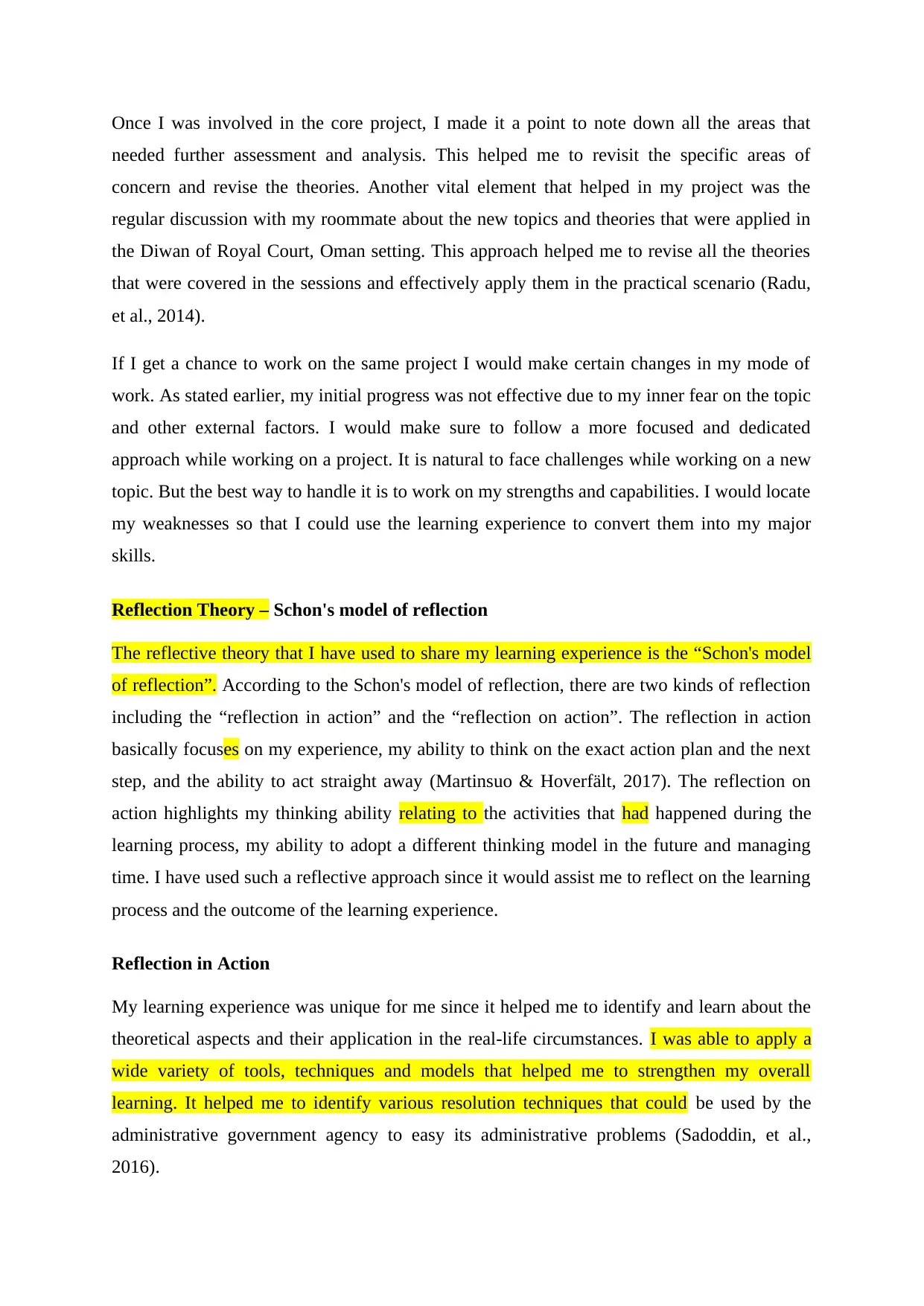
Once I was involved in the core project, I made it a point to note down all the areas that
needed further assessment and analysis. This helped me to revisit the specific areas of
concern and revise the theories. Another vital element that helped in my project was the
regular discussion with my roommate about the new topics and theories that were applied in
the Diwan of Royal Court, Oman setting. This approach helped me to revise all the theories
that were covered in the sessions and effectively apply them in the practical scenario (Radu,
et al., 2014).
If I get a chance to work on the same project I would make certain changes in my mode of
work. As stated earlier, my initial progress was not effective due to my inner fear on the topic
and other external factors. I would make sure to follow a more focused and dedicated
approach while working on a project. It is natural to face challenges while working on a new
topic. But the best way to handle it is to work on my strengths and capabilities. I would locate
my weaknesses so that I could use the learning experience to convert them into my major
skills.
Reflection Theory – Schon's model of reflection
The reflective theory that I have used to share my learning experience is the “Schon's model
of reflection”. According to the Schon's model of reflection, there are two kinds of reflection
including the “reflection in action” and the “reflection on action”. The reflection in action
basically focuses on my experience, my ability to think on the exact action plan and the next
step, and the ability to act straight away (Martinsuo & Hoverfält, 2017). The reflection on
action highlights my thinking ability relating to the activities that had happened during the
learning process, my ability to adopt a different thinking model in the future and managing
time. I have used such a reflective approach since it would assist me to reflect on the learning
process and the outcome of the learning experience.
Reflection in Action
My learning experience was unique for me since it helped me to identify and learn about the
theoretical aspects and their application in the real-life circumstances. I was able to apply a
wide variety of tools, techniques and models that helped me to strengthen my overall
learning. It helped me to identify various resolution techniques that could be used by the
administrative government agency to easy its administrative problems (Sadoddin, et al.,
2016).
needed further assessment and analysis. This helped me to revisit the specific areas of
concern and revise the theories. Another vital element that helped in my project was the
regular discussion with my roommate about the new topics and theories that were applied in
the Diwan of Royal Court, Oman setting. This approach helped me to revise all the theories
that were covered in the sessions and effectively apply them in the practical scenario (Radu,
et al., 2014).
If I get a chance to work on the same project I would make certain changes in my mode of
work. As stated earlier, my initial progress was not effective due to my inner fear on the topic
and other external factors. I would make sure to follow a more focused and dedicated
approach while working on a project. It is natural to face challenges while working on a new
topic. But the best way to handle it is to work on my strengths and capabilities. I would locate
my weaknesses so that I could use the learning experience to convert them into my major
skills.
Reflection Theory – Schon's model of reflection
The reflective theory that I have used to share my learning experience is the “Schon's model
of reflection”. According to the Schon's model of reflection, there are two kinds of reflection
including the “reflection in action” and the “reflection on action”. The reflection in action
basically focuses on my experience, my ability to think on the exact action plan and the next
step, and the ability to act straight away (Martinsuo & Hoverfält, 2017). The reflection on
action highlights my thinking ability relating to the activities that had happened during the
learning process, my ability to adopt a different thinking model in the future and managing
time. I have used such a reflective approach since it would assist me to reflect on the learning
process and the outcome of the learning experience.
Reflection in Action
My learning experience was unique for me since it helped me to identify and learn about the
theoretical aspects and their application in the real-life circumstances. I was able to apply a
wide variety of tools, techniques and models that helped me to strengthen my overall
learning. It helped me to identify various resolution techniques that could be used by the
administrative government agency to easy its administrative problems (Sadoddin, et al.,
2016).
⊘ This is a preview!⊘
Do you want full access?
Subscribe today to unlock all pages.

Trusted by 1+ million students worldwide
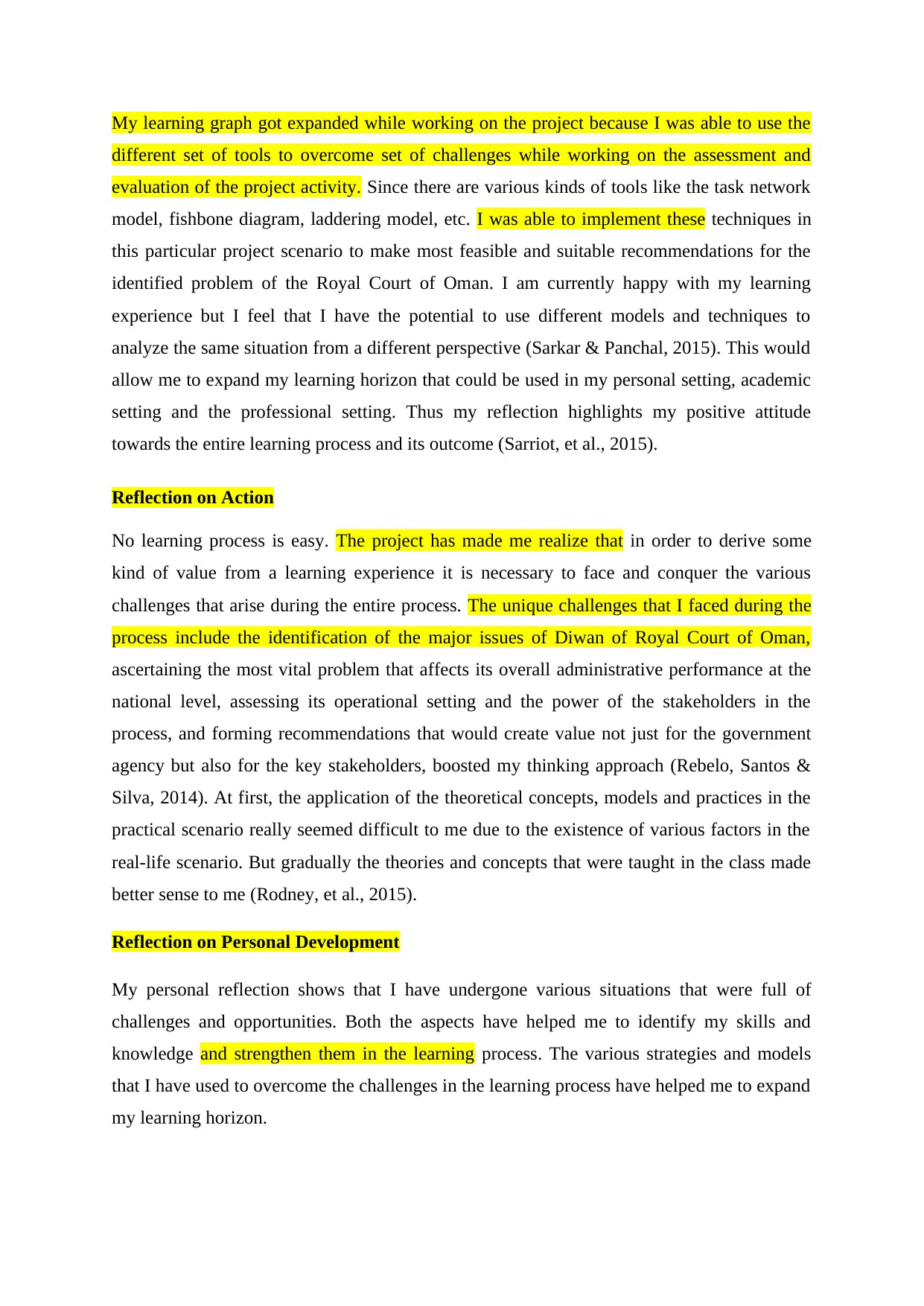
My learning graph got expanded while working on the project because I was able to use the
different set of tools to overcome set of challenges while working on the assessment and
evaluation of the project activity. Since there are various kinds of tools like the task network
model, fishbone diagram, laddering model, etc. I was able to implement these techniques in
this particular project scenario to make most feasible and suitable recommendations for the
identified problem of the Royal Court of Oman. I am currently happy with my learning
experience but I feel that I have the potential to use different models and techniques to
analyze the same situation from a different perspective (Sarkar & Panchal, 2015). This would
allow me to expand my learning horizon that could be used in my personal setting, academic
setting and the professional setting. Thus my reflection highlights my positive attitude
towards the entire learning process and its outcome (Sarriot, et al., 2015).
Reflection on Action
No learning process is easy. The project has made me realize that in order to derive some
kind of value from a learning experience it is necessary to face and conquer the various
challenges that arise during the entire process. The unique challenges that I faced during the
process include the identification of the major issues of Diwan of Royal Court of Oman,
ascertaining the most vital problem that affects its overall administrative performance at the
national level, assessing its operational setting and the power of the stakeholders in the
process, and forming recommendations that would create value not just for the government
agency but also for the key stakeholders, boosted my thinking approach (Rebelo, Santos &
Silva, 2014). At first, the application of the theoretical concepts, models and practices in the
practical scenario really seemed difficult to me due to the existence of various factors in the
real-life scenario. But gradually the theories and concepts that were taught in the class made
better sense to me (Rodney, et al., 2015).
Reflection on Personal Development
My personal reflection shows that I have undergone various situations that were full of
challenges and opportunities. Both the aspects have helped me to identify my skills and
knowledge and strengthen them in the learning process. The various strategies and models
that I have used to overcome the challenges in the learning process have helped me to expand
my learning horizon.
different set of tools to overcome set of challenges while working on the assessment and
evaluation of the project activity. Since there are various kinds of tools like the task network
model, fishbone diagram, laddering model, etc. I was able to implement these techniques in
this particular project scenario to make most feasible and suitable recommendations for the
identified problem of the Royal Court of Oman. I am currently happy with my learning
experience but I feel that I have the potential to use different models and techniques to
analyze the same situation from a different perspective (Sarkar & Panchal, 2015). This would
allow me to expand my learning horizon that could be used in my personal setting, academic
setting and the professional setting. Thus my reflection highlights my positive attitude
towards the entire learning process and its outcome (Sarriot, et al., 2015).
Reflection on Action
No learning process is easy. The project has made me realize that in order to derive some
kind of value from a learning experience it is necessary to face and conquer the various
challenges that arise during the entire process. The unique challenges that I faced during the
process include the identification of the major issues of Diwan of Royal Court of Oman,
ascertaining the most vital problem that affects its overall administrative performance at the
national level, assessing its operational setting and the power of the stakeholders in the
process, and forming recommendations that would create value not just for the government
agency but also for the key stakeholders, boosted my thinking approach (Rebelo, Santos &
Silva, 2014). At first, the application of the theoretical concepts, models and practices in the
practical scenario really seemed difficult to me due to the existence of various factors in the
real-life scenario. But gradually the theories and concepts that were taught in the class made
better sense to me (Rodney, et al., 2015).
Reflection on Personal Development
My personal reflection shows that I have undergone various situations that were full of
challenges and opportunities. Both the aspects have helped me to identify my skills and
knowledge and strengthen them in the learning process. The various strategies and models
that I have used to overcome the challenges in the learning process have helped me to expand
my learning horizon.
Paraphrase This Document
Need a fresh take? Get an instant paraphrase of this document with our AI Paraphraser
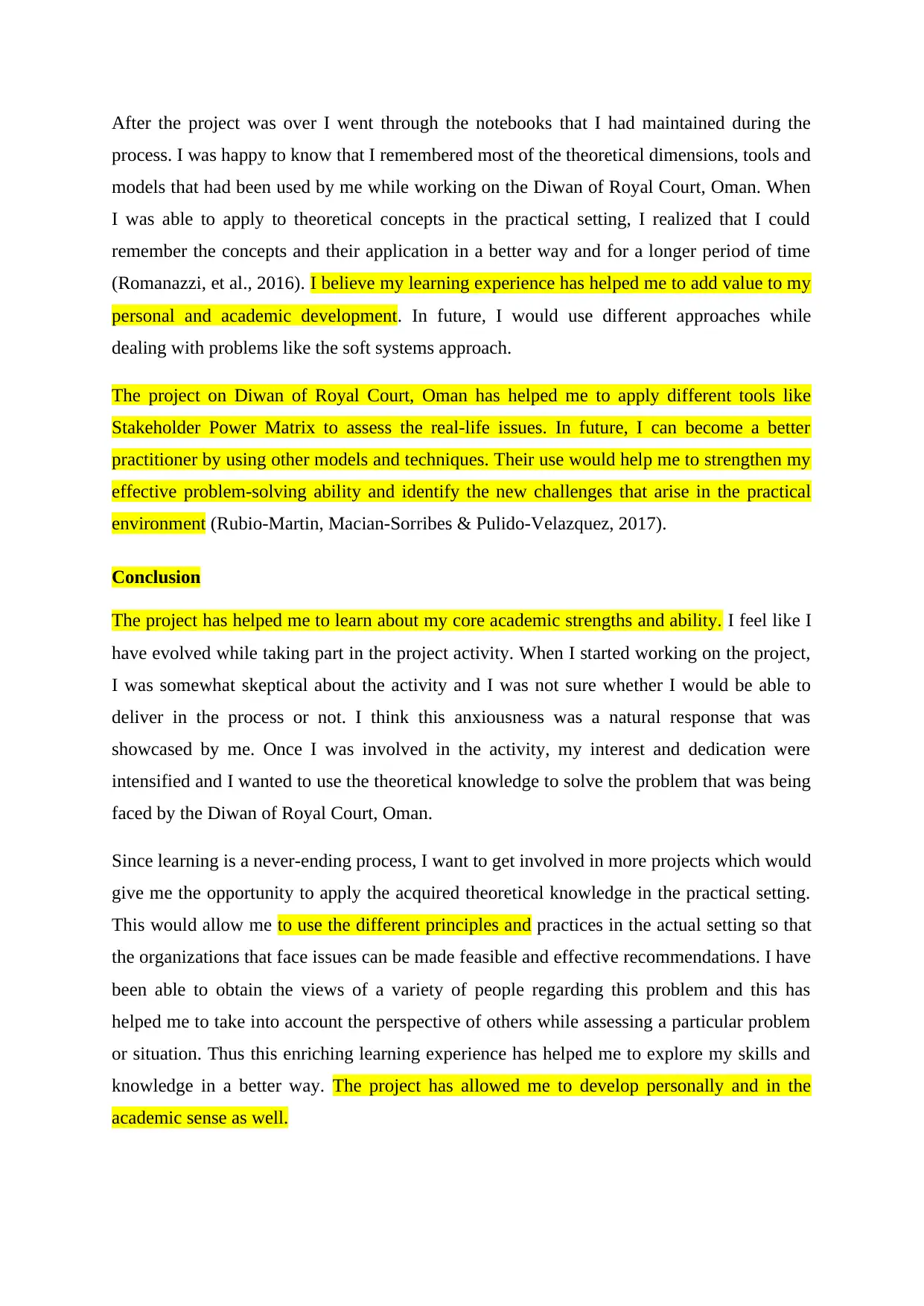
After the project was over I went through the notebooks that I had maintained during the
process. I was happy to know that I remembered most of the theoretical dimensions, tools and
models that had been used by me while working on the Diwan of Royal Court, Oman. When
I was able to apply to theoretical concepts in the practical setting, I realized that I could
remember the concepts and their application in a better way and for a longer period of time
(Romanazzi, et al., 2016). I believe my learning experience has helped me to add value to my
personal and academic development. In future, I would use different approaches while
dealing with problems like the soft systems approach.
The project on Diwan of Royal Court, Oman has helped me to apply different tools like
Stakeholder Power Matrix to assess the real-life issues. In future, I can become a better
practitioner by using other models and techniques. Their use would help me to strengthen my
effective problem-solving ability and identify the new challenges that arise in the practical
environment (Rubio-Martin, Macian-Sorribes & Pulido-Velazquez, 2017).
Conclusion
The project has helped me to learn about my core academic strengths and ability. I feel like I
have evolved while taking part in the project activity. When I started working on the project,
I was somewhat skeptical about the activity and I was not sure whether I would be able to
deliver in the process or not. I think this anxiousness was a natural response that was
showcased by me. Once I was involved in the activity, my interest and dedication were
intensified and I wanted to use the theoretical knowledge to solve the problem that was being
faced by the Diwan of Royal Court, Oman.
Since learning is a never-ending process, I want to get involved in more projects which would
give me the opportunity to apply the acquired theoretical knowledge in the practical setting.
This would allow me to use the different principles and practices in the actual setting so that
the organizations that face issues can be made feasible and effective recommendations. I have
been able to obtain the views of a variety of people regarding this problem and this has
helped me to take into account the perspective of others while assessing a particular problem
or situation. Thus this enriching learning experience has helped me to explore my skills and
knowledge in a better way. The project has allowed me to develop personally and in the
academic sense as well.
process. I was happy to know that I remembered most of the theoretical dimensions, tools and
models that had been used by me while working on the Diwan of Royal Court, Oman. When
I was able to apply to theoretical concepts in the practical setting, I realized that I could
remember the concepts and their application in a better way and for a longer period of time
(Romanazzi, et al., 2016). I believe my learning experience has helped me to add value to my
personal and academic development. In future, I would use different approaches while
dealing with problems like the soft systems approach.
The project on Diwan of Royal Court, Oman has helped me to apply different tools like
Stakeholder Power Matrix to assess the real-life issues. In future, I can become a better
practitioner by using other models and techniques. Their use would help me to strengthen my
effective problem-solving ability and identify the new challenges that arise in the practical
environment (Rubio-Martin, Macian-Sorribes & Pulido-Velazquez, 2017).
Conclusion
The project has helped me to learn about my core academic strengths and ability. I feel like I
have evolved while taking part in the project activity. When I started working on the project,
I was somewhat skeptical about the activity and I was not sure whether I would be able to
deliver in the process or not. I think this anxiousness was a natural response that was
showcased by me. Once I was involved in the activity, my interest and dedication were
intensified and I wanted to use the theoretical knowledge to solve the problem that was being
faced by the Diwan of Royal Court, Oman.
Since learning is a never-ending process, I want to get involved in more projects which would
give me the opportunity to apply the acquired theoretical knowledge in the practical setting.
This would allow me to use the different principles and practices in the actual setting so that
the organizations that face issues can be made feasible and effective recommendations. I have
been able to obtain the views of a variety of people regarding this problem and this has
helped me to take into account the perspective of others while assessing a particular problem
or situation. Thus this enriching learning experience has helped me to explore my skills and
knowledge in a better way. The project has allowed me to develop personally and in the
academic sense as well.
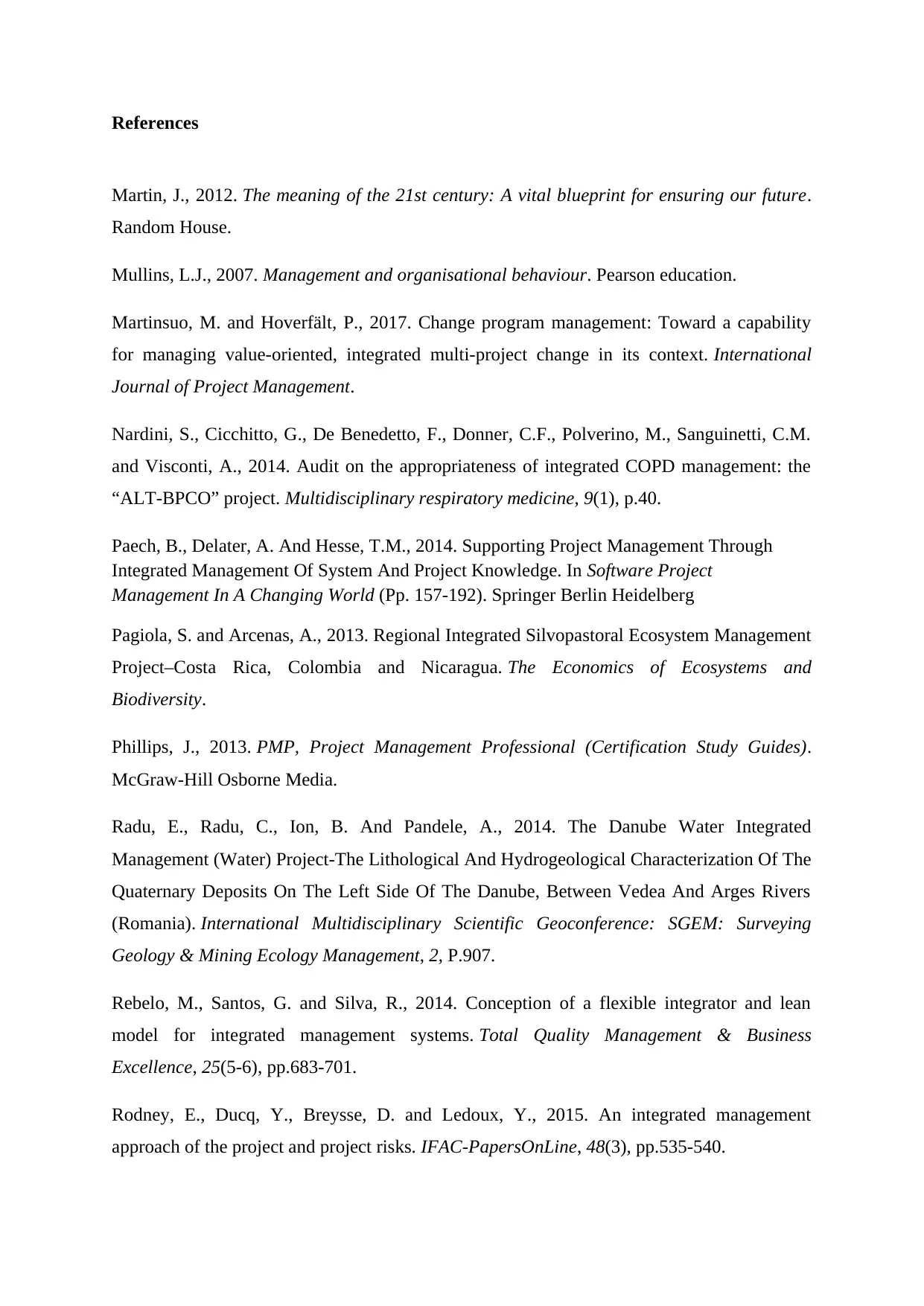
References
Martin, J., 2012. The meaning of the 21st century: A vital blueprint for ensuring our future.
Random House.
Mullins, L.J., 2007. Management and organisational behaviour. Pearson education.
Martinsuo, M. and Hoverfält, P., 2017. Change program management: Toward a capability
for managing value-oriented, integrated multi-project change in its context. International
Journal of Project Management.
Nardini, S., Cicchitto, G., De Benedetto, F., Donner, C.F., Polverino, M., Sanguinetti, C.M.
and Visconti, A., 2014. Audit on the appropriateness of integrated COPD management: the
“ALT-BPCO” project. Multidisciplinary respiratory medicine, 9(1), p.40.
Paech, B., Delater, A. And Hesse, T.M., 2014. Supporting Project Management Through
Integrated Management Of System And Project Knowledge. In Software Project
Management In A Changing World (Pp. 157-192). Springer Berlin Heidelberg
Pagiola, S. and Arcenas, A., 2013. Regional Integrated Silvopastoral Ecosystem Management
Project–Costa Rica, Colombia and Nicaragua. The Economics of Ecosystems and
Biodiversity.
Phillips, J., 2013. PMP, Project Management Professional (Certification Study Guides).
McGraw-Hill Osborne Media.
Radu, E., Radu, C., Ion, B. And Pandele, A., 2014. The Danube Water Integrated
Management (Water) Project-The Lithological And Hydrogeological Characterization Of The
Quaternary Deposits On The Left Side Of The Danube, Between Vedea And Arges Rivers
(Romania). International Multidisciplinary Scientific Geoconference: SGEM: Surveying
Geology & Mining Ecology Management, 2, P.907.
Rebelo, M., Santos, G. and Silva, R., 2014. Conception of a flexible integrator and lean
model for integrated management systems. Total Quality Management & Business
Excellence, 25(5-6), pp.683-701.
Rodney, E., Ducq, Y., Breysse, D. and Ledoux, Y., 2015. An integrated management
approach of the project and project risks. IFAC-PapersOnLine, 48(3), pp.535-540.
Martin, J., 2012. The meaning of the 21st century: A vital blueprint for ensuring our future.
Random House.
Mullins, L.J., 2007. Management and organisational behaviour. Pearson education.
Martinsuo, M. and Hoverfält, P., 2017. Change program management: Toward a capability
for managing value-oriented, integrated multi-project change in its context. International
Journal of Project Management.
Nardini, S., Cicchitto, G., De Benedetto, F., Donner, C.F., Polverino, M., Sanguinetti, C.M.
and Visconti, A., 2014. Audit on the appropriateness of integrated COPD management: the
“ALT-BPCO” project. Multidisciplinary respiratory medicine, 9(1), p.40.
Paech, B., Delater, A. And Hesse, T.M., 2014. Supporting Project Management Through
Integrated Management Of System And Project Knowledge. In Software Project
Management In A Changing World (Pp. 157-192). Springer Berlin Heidelberg
Pagiola, S. and Arcenas, A., 2013. Regional Integrated Silvopastoral Ecosystem Management
Project–Costa Rica, Colombia and Nicaragua. The Economics of Ecosystems and
Biodiversity.
Phillips, J., 2013. PMP, Project Management Professional (Certification Study Guides).
McGraw-Hill Osborne Media.
Radu, E., Radu, C., Ion, B. And Pandele, A., 2014. The Danube Water Integrated
Management (Water) Project-The Lithological And Hydrogeological Characterization Of The
Quaternary Deposits On The Left Side Of The Danube, Between Vedea And Arges Rivers
(Romania). International Multidisciplinary Scientific Geoconference: SGEM: Surveying
Geology & Mining Ecology Management, 2, P.907.
Rebelo, M., Santos, G. and Silva, R., 2014. Conception of a flexible integrator and lean
model for integrated management systems. Total Quality Management & Business
Excellence, 25(5-6), pp.683-701.
Rodney, E., Ducq, Y., Breysse, D. and Ledoux, Y., 2015. An integrated management
approach of the project and project risks. IFAC-PapersOnLine, 48(3), pp.535-540.
⊘ This is a preview!⊘
Do you want full access?
Subscribe today to unlock all pages.

Trusted by 1+ million students worldwide
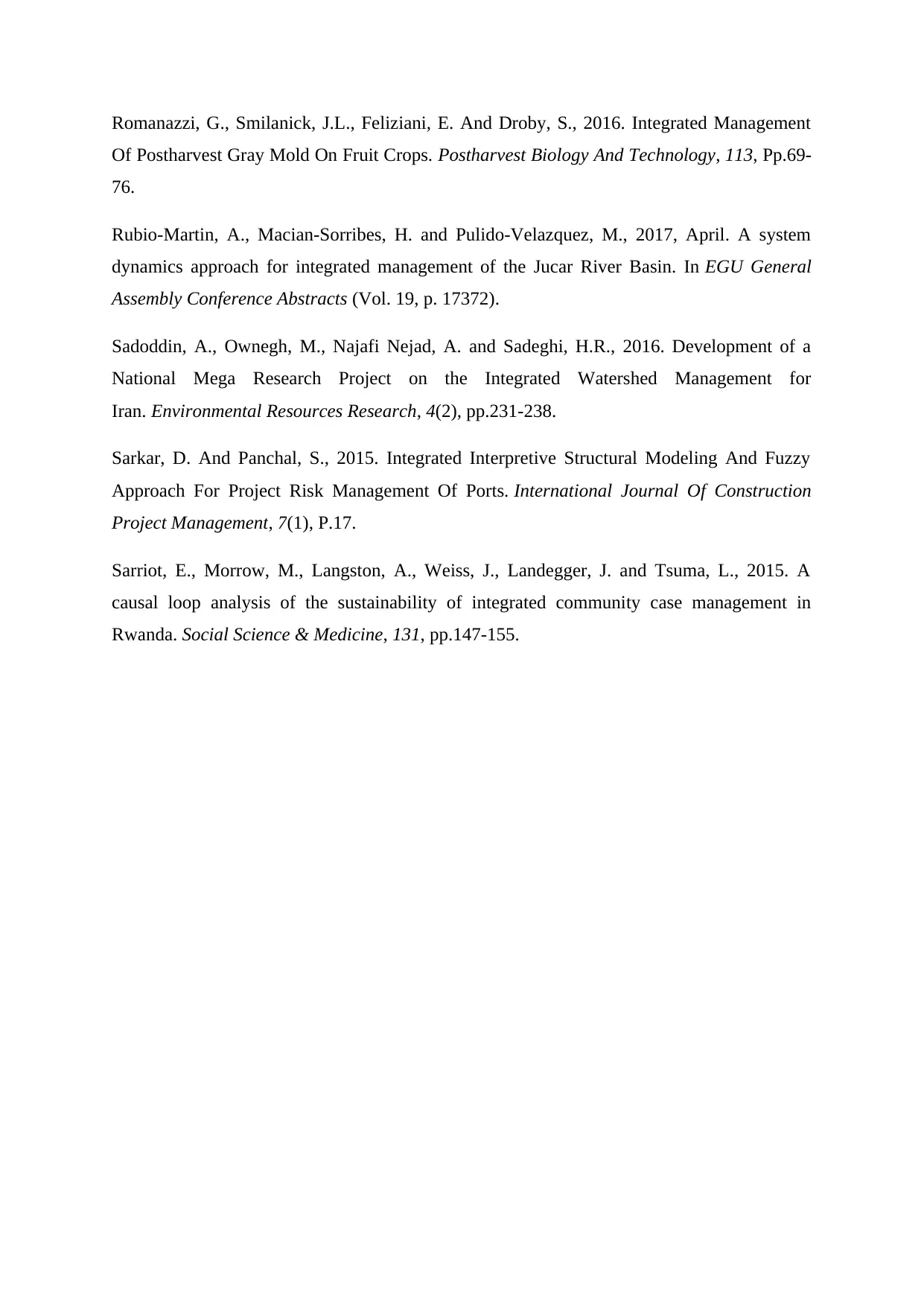
Romanazzi, G., Smilanick, J.L., Feliziani, E. And Droby, S., 2016. Integrated Management
Of Postharvest Gray Mold On Fruit Crops. Postharvest Biology And Technology, 113, Pp.69-
76.
Rubio-Martin, A., Macian-Sorribes, H. and Pulido-Velazquez, M., 2017, April. A system
dynamics approach for integrated management of the Jucar River Basin. In EGU General
Assembly Conference Abstracts (Vol. 19, p. 17372).
Sadoddin, A., Ownegh, M., Najafi Nejad, A. and Sadeghi, H.R., 2016. Development of a
National Mega Research Project on the Integrated Watershed Management for
Iran. Environmental Resources Research, 4(2), pp.231-238.
Sarkar, D. And Panchal, S., 2015. Integrated Interpretive Structural Modeling And Fuzzy
Approach For Project Risk Management Of Ports. International Journal Of Construction
Project Management, 7(1), P.17.
Sarriot, E., Morrow, M., Langston, A., Weiss, J., Landegger, J. and Tsuma, L., 2015. A
causal loop analysis of the sustainability of integrated community case management in
Rwanda. Social Science & Medicine, 131, pp.147-155.
Of Postharvest Gray Mold On Fruit Crops. Postharvest Biology And Technology, 113, Pp.69-
76.
Rubio-Martin, A., Macian-Sorribes, H. and Pulido-Velazquez, M., 2017, April. A system
dynamics approach for integrated management of the Jucar River Basin. In EGU General
Assembly Conference Abstracts (Vol. 19, p. 17372).
Sadoddin, A., Ownegh, M., Najafi Nejad, A. and Sadeghi, H.R., 2016. Development of a
National Mega Research Project on the Integrated Watershed Management for
Iran. Environmental Resources Research, 4(2), pp.231-238.
Sarkar, D. And Panchal, S., 2015. Integrated Interpretive Structural Modeling And Fuzzy
Approach For Project Risk Management Of Ports. International Journal Of Construction
Project Management, 7(1), P.17.
Sarriot, E., Morrow, M., Langston, A., Weiss, J., Landegger, J. and Tsuma, L., 2015. A
causal loop analysis of the sustainability of integrated community case management in
Rwanda. Social Science & Medicine, 131, pp.147-155.
1 out of 7
Related Documents
Your All-in-One AI-Powered Toolkit for Academic Success.
+13062052269
info@desklib.com
Available 24*7 on WhatsApp / Email
![[object Object]](/_next/static/media/star-bottom.7253800d.svg)
Unlock your academic potential
Copyright © 2020–2026 A2Z Services. All Rights Reserved. Developed and managed by ZUCOL.



